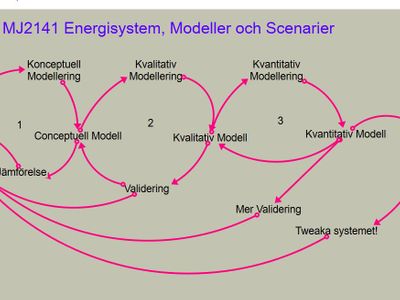MJ2141 Energy Systems, Models and Scenarios 9.0 credits

Choose semester and course offering
Choose semester and course offering to see current information and more about the course, such as course syllabus, study period, and application information.
Application
For course offering
Spring 2025 Start 14 Jan 2025 programme students
Application code
61195
Headings with content from the Course syllabus MJ2141 (Autumn 2010–) are denoted with an asterisk ( )
Content and learning outcomes
Course contents
No information inserted
Intended learning outcomes
No information inserted
Literature and preparations
Specific prerequisites
No information inserted
Recommended prerequisites
No information inserted
Equipment
No information inserted
Literature
No information inserted
Examination and completion
If the course is discontinued, students may request to be examined during the following two academic years.
Grading scale
A, B, C, D, E, FX, F
Examination
- LAB1 - Laboratory, 1.0 credits, grading scale: P, F
- LIT1 - Literature Survey, 2.0 credits, grading scale: P, F
- PRO1 - Project task 1, 3.0 credits, grading scale: A, B, C, D, E, FX, F
- PRO2 - Project task 2, 3.0 credits, grading scale: A, B, C, D, E, FX, F
Based on recommendation from KTH’s coordinator for disabilities, the examiner will decide how to adapt an examination for students with documented disability.
The examiner may apply another examination format when re-examining individual students.
Opportunity to complete the requirements via supplementary examination
No information inserted
Opportunity to raise an approved grade via renewed examination
No information inserted
Examiner
Ethical approach
- All members of a group are responsible for the group's work.
- In any assessment, every student shall honestly disclose any help received and sources used.
- In an oral assessment, every student shall be able to present and answer questions about the entire assignment and solution.
Further information
Course room in Canvas
Registered students find further information about the implementation of the course in the course room in Canvas. A link to the course room can be found under the tab Studies in the Personal menu at the start of the course.
Offered by
Main field of study
Mechanical Engineering
Education cycle
Second cycle
Add-on studies
No information inserted
Contact
Per Lundqvist